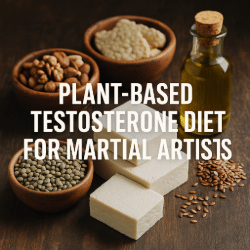Why This Matters for Every Martial Artist — Men and Women
Testosterone isn’t just a “male hormone.” Both men and women produce it, and in both cases it’s critical for:
Muscle repair and strength — Reduced testosterone is linked to decreased muscle protein synthesis (Phillips et al., 2012, Applied Physiology, Nutrition, and Metabolism).
Bone density — Low testosterone correlates with higher osteoporosis risk in both sexes (Falahati-Nini et al., 2000, New England Journal of Medicine).
Reaction speed and mental sharpness — Testosterone influences neurotransmitter systems tied to cognitive function (Janowsky et al., 2000, Hormones and Behavior).
Energy and recovery — Supports mitochondrial function, essential for endurance and resilience (Pitteloud et al., 2005, Journal of Clinical Endocrinology & Metabolism).
For women, optimal levels are much lower than men’s, but drops below the healthy range can still mean slower recovery, more fatigue, and reduced training adaptation — especially post-menopause (Davison et al., 2005, Menopause).
The Case for Food First
Testosterone replacement therapy can have its place in a medical context, but it comes with clinical oversight, potential side effects, and competitive sport restrictions.
An all-natural diet works with your body — giving it the nutrients to produce hormones naturally, without risking disqualification or unintended health consequences.
Core Principles of the Martial Artist’s Testosterone Diet
Anchor Every Meal in Protein + Healthy Fat
Fats — especially monounsaturated and saturated fats — are linked to higher testosterone levels compared to low-fat diets (Volek et al., 1997, Journal of Applied Physiology).Get 2–3 Servings of Cruciferous Vegetables Daily
Crucifers contain indole-3-carbinol, which can help regulate estrogen metabolism (Bradlow et al., 1991, Journal of the National Cancer Institute).Ensure Adequate Micronutrients
Zinc: Deficiency reduces testosterone production; supplementation restores it (Prasad et al., 1996, Nutrition).
Magnesium: Supports free testosterone, especially in active individuals (Cinar et al., 2011, Biological Trace Element Research).
Vitamin D: Supplementation in deficient individuals has been shown to raise testosterone (Pilz et al., 2011, Hormone and Metabolic Research).
Use Carbs Strategically
Adequate carbohydrates lower cortisol during high-intensity training, preserving testosterone (Tremblay et al., 2005, Journal of Strength and Conditioning Research).Hydrate Consistently
Even mild dehydration can blunt hormone production (Judelson et al., 2008, British Journal of Nutrition).
Evidence-Based Foods for Testosterone Support
Protein & Healthy Fats
Eggs — Cholesterol is the raw material for testosterone synthesis (Roche et al., 2000, American Journal of Clinical Nutrition).
Fatty Fish — Omega-3 fatty acids reduce inflammation and may improve testicular function (Safarinejad, 2010, Clinical Nutrition).
Lean Red Meat (moderate) — Rich in zinc, creatine, and bioavailable iron.
Greek Yogurt, Kefir — High in protein and probiotics, which may influence hormone regulation (Cryan et al., 2019, Nature Reviews Gastroenterology & Hepatology).
Vegetables & Herbs
Cruciferous Vegetables — Broccoli, Brussels sprouts, cauliflower (Bradlow et al., 1991).
Garlic & Onions — Animal studies show compounds may stimulate luteinizing hormone (Omar et al., 2006, Phytotherapy Research).
Carbohydrates for Fuel
Quinoa, Sweet Potatoes, Oats — Complex carbs for sustained training energy.
Berries & Citrus — Antioxidants help protect hormone-producing cells from oxidative stress (Aitken et al., 2014, Human Reproduction).
Actionable 7-Day All-Natural Testosterone Meal Plan
Day 1
Breakfast: 3 whole eggs with spinach & onions in olive oil; oatmeal with pumpkin seeds.
Lunch: Grilled salmon, quinoa, broccoli.
Snack: Greek yogurt with walnuts.
Dinner: Grass-fed beef stir-fry with cauliflower and sweet potato.
Day 2
Breakfast: Yogurt parfait with berries, chia seeds, honey.
Lunch: Chicken thighs, brown rice, Brussels sprouts.
Snack: Hard-boiled eggs, almonds.
Dinner: Bison burger (no bun), avocado, roasted root vegetables.
Day 3
Breakfast: Omelet with mushrooms, kale, and feta.
Lunch: Sardine salad on whole grain toast with arugula.
Snack: Pumpkin seeds, dark chocolate (85%+).
Dinner: Lamb stew with carrots, onions, quinoa.
Day 4
Breakfast: Greek yogurt with flaxseeds and banana.
Lunch: Tuna steak, broccoli, roasted sweet potato.
Snack: Kefir smoothie with berries.
Dinner: Chicken stir-fry with garlic, bok choy, brown rice.
Day 5
Breakfast: Scrambled eggs with spinach and mushrooms.
Lunch: Grilled mackerel, quinoa, asparagus.
Snack: Almonds, boiled egg.
Dinner: Grass-fed beef chili with black beans.
Day 6
Breakfast: Oatmeal with walnuts and blueberries.
Lunch: Chicken thighs, Brussels sprouts, brown rice.
Snack: Greek yogurt, pumpkin seeds.
Dinner: Lamb kebabs with peppers and onions.
Day 7
Breakfast: Omelet with broccoli, cheddar, onions.
Lunch: Salmon salad with avocado, olive oil vinaigrette.
Snack: Dark chocolate square, almonds.
Dinner: Bison steak, roasted cauliflower, sweet potato mash.
Adjustments for Women
The same dietary principles apply, but:
Portion Sizes: Adjust calories to activity level, not a male training partner’s plate.
Iron & Calcium: Iron is key pre-menopause; calcium and vitamin D gain importance post-menopause (NIH Office of Dietary Supplements).
Cycle-Aware Nutrition: During the luteal phase, slightly higher calories and magnesium-rich foods may help maintain performance (Sims & Heather, 2018, ROAR).
Foods & Habits to Avoid
Ultra-processed foods — Linked to metabolic and hormonal disruptions (Monteiro et al., 2018, Public Health Nutrition).
Excess alcohol — Chronic use can suppress testosterone (Sarkola & Eriksson, 2003, Alcoholism: Clinical and Experimental Research).
Excessive soy isolates — Whole soy in moderation is fine; high-dose isolates may affect hormone balance in some cases (Messina, 2010, Nutrition Journal).
Very low-fat diets — Fats are required for hormone synthesis (Volek et al., 1997).
Lifestyle Multipliers
Strength Training — Compound lifts and explosive drills support testosterone production (Kraemer et al., 1998, Medicine & Science in Sports & Exercise).
Adequate Sleep — 7–9 hours is essential; one week of sleep restriction can significantly lower testosterone (Leproult & Van Cauter, 2011, JAMA).
Stress Management — High cortisol suppresses testosterone; martial-friendly relaxation methods like Qi Gong or meditation help (Black et al., 2015, Journal of Alternative and Complementary Medicine).
Sunlight or Supplementation — Vitamin D functions like a hormone in the body, influencing testosterone (Pilz et al., 2011).
The Takeaway
An all-natural testosterone diet isn’t about quick fixes or exotic supplements. It’s a sustainable fueling strategy — one that supports performance, recovery, and resilience in both men and women.
For martial artists, eating this way means you’re not just fueling today’s training — you’re building a foundation that will keep you fast, strong, and sharp for decades to come.
Sources
Phillips SM et al., 2012. Appl Physiol Nutr Metab.
Falahati-Nini A et al., 2000. NEJM.
Janowsky JS et al., 2000. Horm Behav.
Pitteloud N et al., 2005. J Clin Endocrinol Metab.
Davison SL et al., 2005. Menopause.
Volek JS et al., 1997. J Appl Physiol.
Bradlow HL et al., 1991. J Natl Cancer Inst.
Prasad AS et al., 1996. Nutrition.
Cinar V et al., 2011. Biol Trace Elem Res.
Pilz S et al., 2011. Horm Metab Res.
Tremblay MS et al., 2005. J Strength Cond Res.
Roche HM et al., 2000. Am J Clin Nutr.
Safarinejad MR, 2010. Clin Nutr.
Cryan JF et al., 2019. Nat Rev Gastroenterol Hepatol.
Omar SH et al., 2006. Phytother Res.
Aitken RJ et al., 2014. Hum Reprod.
NIH Office of Dietary Supplements.
Sims S, Heather C., 2018. ROAR.
Monteiro CA et al., 2018. Public Health Nutr.
Sarkola T, Eriksson CJ, 2003. Alcohol Clin Exp Res.
Messina M, 2010. Nutr J.
Kraemer WJ et al., 1998. Med Sci Sports Exerc.
Leproult R, Van Cauter E, 2011. JAMA.
FAQ about the Testosterone Diet
Does this diet help both men and women?
Yes. Both men and women produce testosterone. The same whole‑food strategy supports strength, recovery, and bone health. Women should scale portions and prioritize iron pre‑menopause and calcium/vitamin D post‑menopause. Always discuss major diet changes with a clinician if you have medical conditions.
What are the top foods for a testosterone‑supportive diet?
Eggs, fatty fish (salmon, sardines, mackerel), lean red meat in moderation, Greek yogurt/kefir, olive oil, nuts/seeds (especially pumpkin), cruciferous vegetables (broccoli, Brussels sprouts, cauliflower), leafy greens, onions/garlic, oats, quinoa, sweet potatoes, and berries.
Is soy a problem?
Whole‑food soy in moderate amounts is generally fine for most people. High‑dose soy isolates or ultra‑processed soy products are not recommended. If you’re concerned, choose varied protein sources.
Do I need supplements, or can I use food only?
Food‑first is preferred. Two common deficiencies that may warrant testing and targeted supplementation are vitamin D and zinc. Get labs and follow your clinician’s guidance rather than self‑supplementing.
How should I time carbs around training?
Use complex carbs pre‑ and post‑training to support effort and recovery (e.g., oats or sweet potato before; fruit and starch with protein after). Outside training windows, keep carbs moderate and fiber‑rich.
Can vegetarians or pescatarians follow this?
Yes. Emphasize eggs, dairy (if tolerated), fish (for pescatarians), legumes, and complete plant protein combinations. Include nuts/seeds, olive oil, crucifers, and leafy greens for micronutrients and healthy fats.
How much alcohol is okay?
Less is better. Regular heavy intake is linked to lower testosterone and poorer recovery. If you drink, keep it occasional and light—especially during hard training blocks.
Is a very low‑fat diet good for hormones?
No. Dietary fat is required for steroid hormone synthesis. Include olive oil, eggs, fatty fish, nuts, seeds, and some saturated fat from quality animal sources.
Should I get bloodwork?
Yes, especially if you have symptoms (fatigue, reduced performance, low mood). Discuss labs (including vitamin D, iron status for women, and total/free testosterone) with a qualified clinician.
How soon will I feel results?
Many athletes notice steadier energy and better recovery within 2–4 weeks. Strength and body composition shifts typically show across 8–12 weeks with consistent training, sleep, and stress management.



